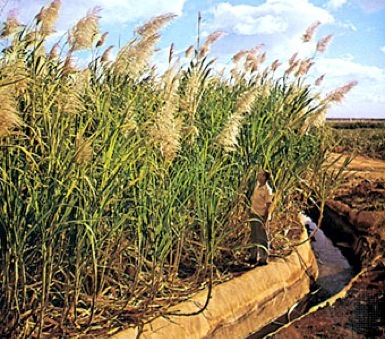Sugar and Cane: A Sweet Pairing in Health-Conscious Recipes
Sugar and Cane: A Sweet Pairing in Health-Conscious Recipes
Blog Article
Why Walking Stick Sugar Handling Chemicals Are Critical for Modern Sugar Refining
The function of walking cane sugar handling chemicals in contemporary sugar refining can not be overstated, as they are indispensable to boosting both the performance of removal and the total high quality of the last item. Representatives such as phosphoric acid and certain flocculants are utilized to get rid of pollutants, resulting in sugar that not only meets consumer assumptions yet also sticks to market requirements.
Duty of Handling Chemicals
The efficiency of cane sugar processing hinges substantially on the tactical application of handling chemicals. These chemicals play a crucial role in boosting the efficiency and quality of sugar removal and refining. From the first phases of juice extraction to the final filtration steps, processing chemicals facilitate numerous vital procedures.
In the removal stage, chemicals such as phosphoric acid and calcium hydroxide are utilized to optimize the information process, helping to get rid of contaminations and suspended solids from the cane juice. This not just improves the return however also makes certain the clearness of the final item. In addition, representatives like flocculants help in the quick settling of contaminations, consequently improving the total process.
Turned on carbon and ion exchange materials serve to remove color and smell, making sure that the refined sugar fulfills consumer quality requirements. Therefore, the careful selection and application of these chemicals are vital for attaining optimal end results in cane sugar processing.
Trick Types of Chemicals
Cane sugar handling counts on a selection of vital chemicals that help with each stage of production. These chemicals play crucial roles in clarifying, bleaching, and purifying the sugar drawn out from walking stick.
One main classification of chemicals includes flocculants, such as polyacrylamide, which help in the explanation process by advertising the aggregation and settling of contaminations. In addition, calcium hydroxide is typically used to counteract level of acidity and aid in the elimination of non-sugar parts.
Lightening representatives, such as triggered carbon and sulfur dioxide, are utilized to decolorize the syrup, leading to a clearer final item. These chemicals aid remove shade substances that may impact the sugar's appearance and marketability.
Furthermore, phosphoric acid functions as a pH regulator during the handling stages, making certain optimal problems for the enzymatic activities associated with sugar extraction and purification.
Other crucial representatives consist of edta (ethylenediaminetetraacetic acid), which chelates metal ions that can catalyze unfavorable responses, and sodium hydroxide, which assists in pH control throughout the refining procedure. Jointly, these chemicals enhance effectiveness and make sure a premium cane sugar product.
Advantages for Sugar Quality
Often forgotten, the use of details processing chemicals significantly boosts the overall high quality of cane sugar. These chemicals play an essential role in refining procedures, ensuring that the last product satisfies stringent sector standards for pureness and taste.

Additionally, processing chemicals help in attaining a regular granulation and texture, which are important for consumer acceptance. By regulating the formation procedure, these chemicals make sure that the sugar crystals develop evenly, bring about a more attractive item that dissolves well in numerous applications.
Furthermore, making use of these chemicals can boost the rack life of cane sugar by decreasing moisture absorption and microbial development. Generally, the calculated application of handling chemicals is important for delivering top quality walking cane sugar that meets consumer expectations and sector demands.
Environmental Impact Factors To Consider
Additionally, the energy-intensive nature of sugar refining, intensified by chemical use, often results in boosted carbon exhausts. This adds to environment adjustment and increases concerns pertaining to the sustainability of existing refining methods. Additionally, the sourcing of these chemicals might include practices that threaten biodiversity, such as monoculture farming, which minimizes the find more strength of farming environments.

To alleviate these influences, sugar refiners are progressively exploring lasting alternatives and adopting finest techniques that lessen chemical use. Carrying out rigorous ecological monitoring systems can help guarantee that the refining process aligns with environmental criteria and advertises biodiversity. Inevitably, a balanced approach that prioritizes both sugar quality and environmental stewardship is crucial for the long-lasting viability of the sugar sector.
Future Fads in Refining
As the sugar industry faces the environmental obstacles linked with typical refining approaches, ingenious methods are emerging to boost both performance and sustainability. One considerable pattern is the fostering of eco-friendly chemistry concepts, which prioritize using non-toxic, biodegradable handling chemicals. This shift not just minimizes ecological impact however also Read Full Report addresses consumer need for cleaner production techniques.
Another encouraging development is the execution of sophisticated purification modern technologies, such as membrane layer separation and adsorption procedures. These strategies boost the clearness and top quality of the sugar while lowering the volume of wastewater created during refining. In addition, the integration of digital modern technologies, including IoT and AI, is changing operational efficiency by making it possible for real-time tracking and anticipating maintenance, hence decreasing source waste.
Furthermore, making use of byproducts from sugar refining, such as bagasse and molasses, is getting traction. These materials can be exchanged biofuels or value-added items, adding to a circular economic climate within the market. Jointly, these trends signal a change in the direction of more sustainable techniques that not only enhance functional efficiency yet likewise line up with global sustainability objectives, making sure the future feasibility of sugar refining.
Verdict
Walking stick sugar handling chemicals are essential in contemporary sugar refining, substantially improving the efficiency and quality of sugar extraction. The strategic use these chemicals not just boosts the pureness and taste of the last item however likewise makes sure regular formation and appearance. As the industry progressively focuses on sustainability, the fostering of environmentally-friendly processing agents is likely to form future patterns in refining, inevitably bring about greater top quality items and prolonged shelf life for consumers.

Inevitably, a well balanced technique that prioritizes both sugar quality and environmental stewardship is necessary for the long-lasting viability of the sugar industry.
Cane sugar handling chemicals are vital in modern-day sugar refining, substantially boosting the here are the findings efficiency and top quality of sugar extraction.
Report this page